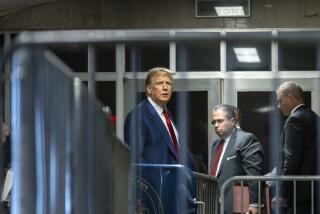Noriega Judge Acts to Resolve Side Issues in Proceedings : Narcotics: He orders new effort to free up some of the Panamanian’s funds for attorneys’ fees. A ruling on the content of recordings is scheduled.
- Share via
MIAMI — He is America’s most famous criminal defendant. But his private telephone conversations have been tape-recorded and broadcast to millions, and his bank accounts frozen so that he cannot pay his lawyers. On Monday the presiding federal judge admitted that the case against Gen. Manuel A. Noriega has an image problem.
“I am deeply concerned about the image this case seems to be acquiring, that the defendant is not able to get a fair trial,” said U.S. District Judge William M. Hoeveler. “I’ve heard it joked about, spoken about in public.
“I’m bound and determined that this defendant is going to get a fair trial, so I want to dispose of these collateral issues.”
To that end, Hoeveler ordered prosecutors to try again to free up some of the $27 million the former Panamanian dictator stashed in foreign bank accounts. He also said he would rule Wednesday on whether Cable News Network could air jailhouse recordings of Noriega talking to his attorneys. Two weeks ago, Hoeveler issued a temporary restraining order barring such broadcasts.
During meetings with attorneys in the courtroom and in his chambers, Hoeveler showed his determination to reassert control over the case, which has been sidetracked by the issues of the tapes and attorneys fees.
Hoeveler said he was unable to find any legal means to override the $75-an-hour federal cap on fees defense attorney Frank A. Rubino and his colleagues each could be paid as court-appointed counsels. Rubino has asked to quit the case unless the cap is raised or money from Noriega’s accounts is made available.
That money has been frozen on orders of the U.S. government, on the grounds that the money was acquired in drug deals. Noriega’s defense team has not been paid in the 11 months since the general was seized during the military invasion of Panama and brought here to face drug charges.
Hoeveler told prosecutors to either find funds that were not tainted by drug dealing, or be prepared to prove in an evidentiary hearing that all of Noriega’s money was acquired illegally. “A very fine idea, your honor,” Rubino told the court. Later Rubino said to reporters: “It’s my opinion that Judge Hoeveler believes the government can do more than they have done to release these funds. He’s going to put their feet to the fire.”
If the U.S. government cannot prove that money now frozen in overseas bank accounts represented drug profits, Hoeveler said he himself would ask the foreign governments to make it available. “I don’t even know if I have the authority to do it,” he added.
Earlier Monday Hoeveler met with attorneys in chambers and promised to rule Wednesday on the contents of several tape recordings of Noriega’s telephone conversations. Parts of several tapes were aired earlier this month by Cable News Network in defiance of Hoeveler’s temporary restraining order.
CNN contends that the broadcast of the recordings, made at the federal prison south of here where Noriega is being held, are protected by the 1st Amendment. Rubino argues that the tapes contain privileged attorney-client conversations, and that broadcast violates Noriega’s 6th Amendment right to a fair trial.
Last week the tapes were turned over to a federal magistrate, who is to report to Hoeveler today on the content of the conversations. Hoeveler said he would then meet in private with attorneys for Noriega, the government and CNN, listen to arguments, make a ruling and answer the appeal of the losing side “no matter how long it takes.”
More to Read
Sign up for Essential California
The most important California stories and recommendations in your inbox every morning.
You may occasionally receive promotional content from the Los Angeles Times.












